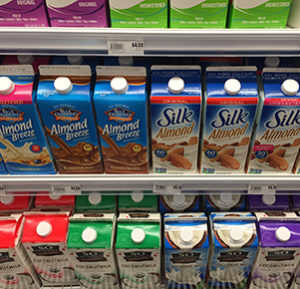Alternatives to Milk
 Although milk alternatives make up just 8% of overall milk sales in the U.S., the market for these dairy free products are on the rise. For vegans, individuals with food allergies, the lactose intolerant, or simply those who want low-calorie, low-sugar, lactose-free alternatives for their coffee in the morning, plant-based milks are the product for them. Below are some of the most well-known milk alternatives, with information including health benefits and recommendations for use. Enjoy!
Although milk alternatives make up just 8% of overall milk sales in the U.S., the market for these dairy free products are on the rise. For vegans, individuals with food allergies, the lactose intolerant, or simply those who want low-calorie, low-sugar, lactose-free alternatives for their coffee in the morning, plant-based milks are the product for them. Below are some of the most well-known milk alternatives, with information including health benefits and recommendations for use. Enjoy!
SOY MILK
Soy milk has a creamy, rich flavor and a nutritional profile that is the most similar to dairy milks. In addition, compared to other non-dairy drinks, soy milk contains a higher amount of protein and calcium. Due to its thick and creamy consistency, soy milk is ideal in smoothies, cooking and baking.
RICE MILK
Rice milk is typically made of 14% rice with the rest oil, salt, and water. Although it is a bit watery compared to other non-dairy products, rice milk provides a naturally sweet taste with only 1% fat. In addition, rice milk is very good for those with nut, soy, or seed allergies as it is incredibly easy on the digestive system. However, since its main source is rice, this alternative contains a much higher amount of carbohydrates and does not contain as much protein as other non-dairy milks. Because of its thin consistency, rice milk is best used in cereal or smoothies.
HEMP MILK
Hemp milk is non-dairy product that comes from hemp seeds that are soaked and ground in water. This results in a nutty-creamy flavored milk that contains a high amount of calcium and protein. In addition, hemp milk has essential fatty acids such as omega-3 and omega-6 that can reduce the risk of heart disease and help to build healthy cells. This type of milk is recommended to be used in cappuccinos or lattes as it froths much better than other plant-based varieties.
ALMOND MILK
Almond milk has a light texture and a subtle nutty taste. In comparison to other non-dairy products, almond milk is naturally packed with vitamin E, vitamin B, magnesium, calcium, healthy fats, iron, and zinc (to just name a few). Due to its milder flavor and thinner texture, this type of alternative is ideally used in coffee, tea, and smoothies.
By Emma Patrone / Student Blogger
Emma is a junior at James Madison University, pursuing a degree in communications with a concentration in public relations. She has a double minor in writing as well as British communications and media. She is also a member of the PRSSA club at JMU, as well as a member of the Zeta Tau Alpha fraternity.














